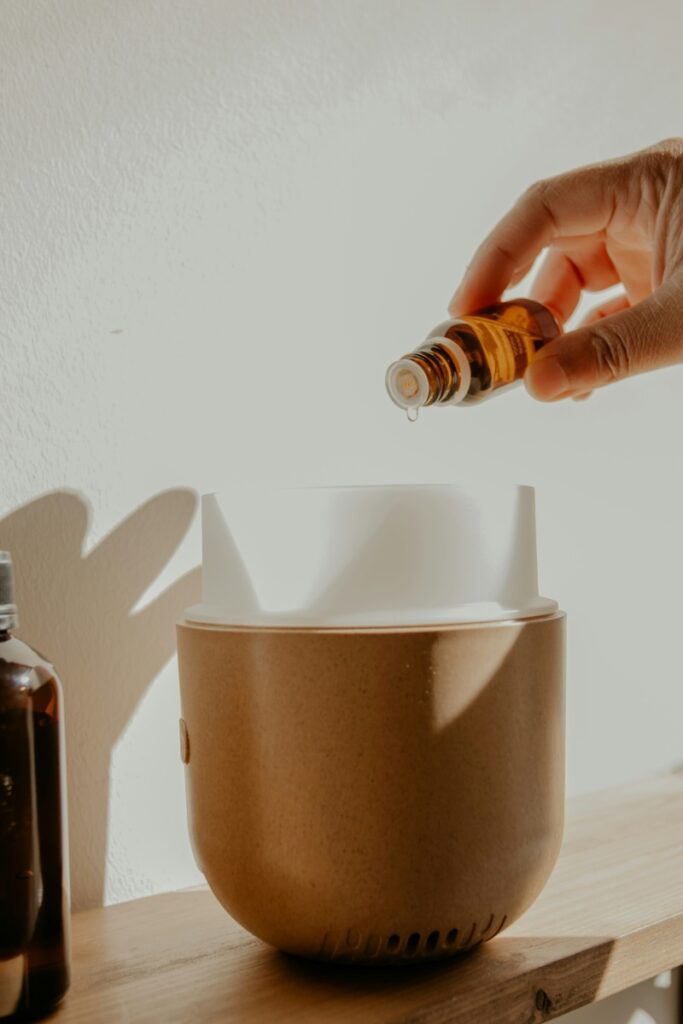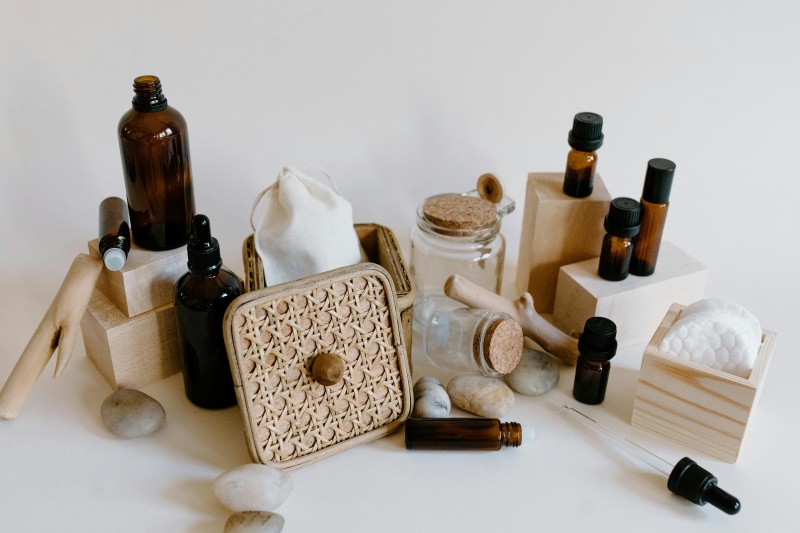Over the years, the popularity of essential oils has risen, with more and more scientific evidence suggesting their healing properties as potential alternatives to prescription medications.
What Are Essential Oils?

Essential oils are liquid extracts obtained from different plants that may have potential benefits. The manufacturing process involves extracting useful compounds from these plants.
Essential oils typically have a more intense fragrance compared to the original plants, and they contain higher concentrations of active ingredients. This is influenced by the quantity of plant material needed to produce the essential oil.
How Are Essential Oils Extracted?
There are different ways to extract the essential oils, including:
- Steam or water distillation: This process passes water or hot steam through the plants, pulling the essential compounds away from the plant matter.
- Cold pressing: This process works by mechanically pressing or squeezing plant matter to cause it to release essential juices or oils. A simple example of this would be smelling the fresh scent of lemon after squeezing or zesting a lemon peel.
After extracting the active compounds from the plant matter, some manufacturers may add them to a carrier oil to get more products from the same amount of essential oil. These products would no longer be pure essential oils but a mixture.
Common Types of Essential Oils and Their Benefits
There are over 90 kinds of essential oils, each having its own special scent and potential health advantages. Here’s a list of essential oils and the health claims linked to them:
| Essential Oils for Relaxation and Stress Relief | |
| Mānuka Oil | Contains compounds like triketones, alpha-pinene and beta-pinene, which have calming and soothing effects on the nervous system; helps reduce anxiety and promote relaxation. |
| Lavender Oil | Known for its calming properties, it helps with relaxation and better sleep. |
| Chamomile Oil | Valued for its soothing effects, chamomile promotes relaxation. |
| Ylang Ylang Oil | With a sweet floral scent, it is believed to enhance mood and reduce stress. |
| Bergamot Oil | Known for its citrusy aroma, bergamot is used to alleviate stress and uplift mood. |
| Frankincense Oil | Used in meditation, frankincense has a calming effect on the mind. |
| Essential Oils for Skincare | |
| Mānuka Oil | Known for its potent antibacterial and antifungal properties, effective in treating various skin conditions, including acne, fungal infections, and minor wounds. |
| Tea Tree Oil | Recognised for its antimicrobial properties, tea tree oil is commonly used for skincare, especially for acne-prone skin. |
| Lavender Oil | Known for its soothing properties, lavender oil is often used to calm irritated skin and promote a healthy complexion. |
| Rosehip Oil | Rich in antioxidants and vitamins, rosehip oil is valued for its potential to nourish and rejuvenate the skin. |
| Frankincense Oil | With anti-inflammatory properties, frankincense oil is used to promote skin health and reduce the appearance of fine lines. |
| Chamomile Oil | Known for its calming effects, chamomile oil can soothe sensitive skin and may help with conditions including eczema. |
| Essential Oils for Natural Cleaning | |
| Mānuka Oil | Has antimicrobial properties make it a great natural alternative for cleaning and disinfecting surfaces at home. |
| Lemon Oil | With its fresh citrus scent, lemon oil is known for its antibacterial properties and is often used for natural cleaning. |
| Tea Tree Oil | Recognised for its antimicrobial and antifungal properties, tea tree oil is a common choice for natural cleaning solutions. |
| Peppermint Oil | Known for its invigorating scent, peppermint oil has antibacterial properties and is used for its fresh and clean aroma in cleaning products. |
| Eucalyptus Oil | With a clean and refreshing fragrance, eucalyptus oil has antiseptic properties, making it suitable for natural cleaning. |
| Lavender Oil | Besides its calming scent, lavender oil has some antibacterial properties and can be used in natural cleaning formulations. |
Other Health Benefits of Essential Oils
Using essential oils may have different benefits, but it’s important to remember that people’s experiences can vary. Some common advantages include:
- Aromatherapy: Essential oils are often used in aromatherapy to help people relax, reduce stress, and improve their mood.
- Stress and Anxiety Reduction: Certain essential oils, such as lavender and chamomile, are thought to have calming properties that might help with stress and anxiety.
- Better Sleep: Some people find that certain essential oils, such as lavender and cedarwood, can make them feel more relaxed and improve the quality of their sleep when used before bedtime.
- Pain Relief: Certain essential oils, including peppermint and eucalyptus, are believed to relieve pain and can be applied topically for muscle aches.
- Skincare: Essential oils such as tea tree and lavender are commonly used in skincare because they may have properties that fight microbes and soothe the skin.
- Respiratory Health: Eucalyptus and peppermint oils are often used to help with breathing difficulties and congestion.
- Mood Improvement: Essential oils such as citrus oils (e.g., orange, lemon) are believed to have uplifting properties that can positively affect mood.
- Natural Insect Repellent: Some essential oils, such citronella and lemongrass, are used to keep insects away naturally.
- Cognitive Function: Certain essential oils, such as rosemary and peppermint, are thought to improve focus and concentration.
- Antimicrobial Properties: Some essential oils, such as tea tree and thyme, are known for their potential to fight microbes and bacteria.
Buying Quality Essential Oils
Not all essential oils are made with the highest purity and authenticity in mind, and, unfortunately, they’re not regulated by the FDA. This means you need to be your own supporter when it comes to finding the good quality ones. Here are some guidelines to follow:
- Ensure that quality essential oils are 100% pure, devoid of additives, fillers, or synthetic components.
- High-quality essential oils exhibit a robust aroma and are not diluted with additional ingredients.
- Opt for essential oils certified as organic, originating from the country where they are grown and harvested.
- Examine the label for both the Latin name of the plant and the country of origin.
- Steer clear of essential oils labeled as “fragrance oils” or “perfume oils,” as these do not qualify as pure essential oils.
- Read customer reviews to gauge the quality of the essential oils.
- Confirm whether the essential oil company provides a money-back guarantee.
- Conduct research on the company’s reputation and commitment to maintaining high quality.
Ways to Use Essential Oils in Everyday Life
Incorporating essential oils into your everyday routine can truly benefit overall mental and physical health. Check out some different ways to use essential oils in your daily regimen.
Diffusion: Add a few drops of your favourite essential oil to a diffuser to fill your living spaces with pleasant aromas.
Topical Application: Dilute essential oils with a carrier oil and apply to the skin for massage, skincare, or to address specific concerns.
Inhalation: Inhale the aroma directly from the bottle or add a few drops to a tissue for a quick mood boost.
Bathing: Add a few drops of essential oil to your bathwater for a relaxing and aromatic bath experience.
Room Spray: Create a homemade room spray by mixing essential oils with water in a spray bottle for a natural air freshener.
DIY Cleaning Products: Incorporate essential oils such as tea tree, lemon, or eucalyptus into homemade cleaning solutions for a fresh and clean scent.
Linen and Pillow Sprays: Spritz a blend of water and essential oils on your pillows or linens for a soothing and calming effect.
Aromatherapy Jewellery: Use essential oil diffuser jewellery, such as bracelets or necklaces, to carry your favourite scents with you throughout the day.
Yoga or Meditation: Apply calming essential oils before yoga or meditation sessions to enhance relaxation and focus.
Homemade Skincare: Incorporate essential oils into your skincare routine by adding a drop or two to your moisturiser or creating your own facial oil blend.
Remember to follow proper guidelines for dilution and usage, and consider individual sensitivities when incorporating essential oils into your daily routine.
Safety Guidelines for Using Essential Oils
Although essential oils offer many benefits, it’s important to handle them carefully. These strong plant extracts are potent, so it’s wise to use them with caution. Before applying them to your skin, it’s recommended to mix essential oils with a carrier oil to avoid possible skin irritation or sensitivity. Some oils may not be suitable for people with specific medical conditions or during pregnancy. Consulting with a qualified aromatherapist or healthcare professional before using essential oils is a good idea, especially if you have concerns or existing health conditions.

